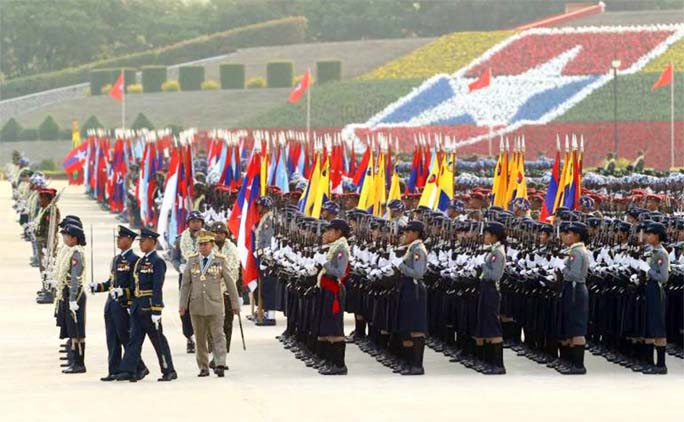
AFP :
Three rapists were jailed for 20 years with hard labour in a case that pitted a 36-year-old mother of four against the powerful military.
After being gang-raped by soldiers, steely eyed Thein Nu went up against Myanmar’s powerful military in a months-long fight for justice – a fight that paid off with a rare legal victory.
Her three rapists were jailed for 20 years with hard labour, a sentence she hopes will give other survivors the courage to speak up and challenge the military’s impunity.
Lodging a legal complaint pitted the 36-year-old mother of four against Myanmar’s most powerful institution, whose soldiers have long been accused by rights groups of using rape as a weapon of war in the country’s conflict zones.
The crime was committed in June in northern Rakhine state – the site of a nearly two-year battle between the military and the Arakan Army, which is fighting for more autonomy for the ethnic Rakhine population. “Many women like me have already endured the same thing,” Thein Nu – who has been given a pseudonym to protect her identity – told the AFP news agency.
“If I didn’t reveal this, it could lead to many more in Rakhine [being abused].”
Her victory came after an initial denial from the military, which said she made up the allegations, and she still faces the glare of widespread social stigma, including from her husband who refuses to speak to her.
Watershed moment?
“I am both happy and sad,” she said, still in disbelief that the military tribunal ruled in her favour.
“I don’t entirely believe this verdict will stop the rape and abuse against women in conflict areas because they (the military) are unreliable people with two faces.”
In a rare acknowledgement of wrongdoing, the military on Saturday announced the verdict and sentence against the three rapists, trumpeting its own “transparent” investigation of the case.
But observers warned it is too soon to judge whether Thein Nu’s victory will be a watershed moment for the armed forces – which ruled Myanmar outright until 2011 and still holds sway over many aspects of life in the country.
Three rapists were jailed for 20 years with hard labour in a case that pitted a 36-year-old mother of four against the powerful military.
After being gang-raped by soldiers, steely eyed Thein Nu went up against Myanmar’s powerful military in a months-long fight for justice – a fight that paid off with a rare legal victory.
Her three rapists were jailed for 20 years with hard labour, a sentence she hopes will give other survivors the courage to speak up and challenge the military’s impunity.
Lodging a legal complaint pitted the 36-year-old mother of four against Myanmar’s most powerful institution, whose soldiers have long been accused by rights groups of using rape as a weapon of war in the country’s conflict zones.
The crime was committed in June in northern Rakhine state – the site of a nearly two-year battle between the military and the Arakan Army, which is fighting for more autonomy for the ethnic Rakhine population. “Many women like me have already endured the same thing,” Thein Nu – who has been given a pseudonym to protect her identity – told the AFP news agency.
“If I didn’t reveal this, it could lead to many more in Rakhine [being abused].”
Her victory came after an initial denial from the military, which said she made up the allegations, and she still faces the glare of widespread social stigma, including from her husband who refuses to speak to her.
Watershed moment?
“I am both happy and sad,” she said, still in disbelief that the military tribunal ruled in her favour.
“I don’t entirely believe this verdict will stop the rape and abuse against women in conflict areas because they (the military) are unreliable people with two faces.”
In a rare acknowledgement of wrongdoing, the military on Saturday announced the verdict and sentence against the three rapists, trumpeting its own “transparent” investigation of the case.
But observers warned it is too soon to judge whether Thein Nu’s victory will be a watershed moment for the armed forces – which ruled Myanmar outright until 2011 and still holds sway over many aspects of life in the country.

